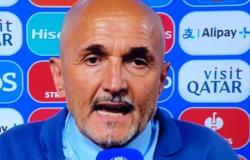The group stage of the men’s European football championships is about to end, the last matches will be played on Wednesday evening, and we can already say that the most surprising team up to this point has been Austria, who won the difficult group D ahead of France, Holland and Poland. After losing their debut game 1-0 against France due to an own goal, Austria won 3-1 against Poland and 3-2 against the Netherlands, finishing with 6 points, one more than France and two more than Holland.
In the round of 16, they will play against the second-placed team in Group F (so one between Turkey, Czech Republic and Portugal) and, if they were to advance to the next round, in the quarterfinals they will play against the winner of the match between the first-placed team in Group E (the one with Belgium, Romania, Slovakia and Ukraine) and a third-placed team yet to be determined. In short, they will have a not excessively challenging draw until the possible semi-finals and, especially considering how they played in the first three matches, there are those who think they can go far in these European Championships. The site The Athletic wrote that Austria is becoming one of the favorites from being an outsider, while according to the Guardian at this point «it takes courage not to believe in a long race in the final phase of Rangnick and his dynamos».
Ralf Rangnick is the coach of Austria and “dynamo” is like the Guardian defined his players by the truly exceptional intensity with which they play: «They are fast, they are fun and they are beautiful to look at», he says The Athletic. Rangnick is 65 years old, German and has coached Austria since 2022; he is considered a coach who had a huge influence on a style of play that in the last ten or fifteen years has developed in Germany and then throughout Europe, the one based on gegenpressing, that is, the attempt to recover the ball immediately after losing it and, once recovered, to get a shot on goal as quickly as possible. It is a very tiring way of playing on an athletic level but which, if done with organisation, is often effective and also exciting for those who watch the matches.
Rangnick’s principles inspire some of the coaches today considered among the most brilliant and modern in Europe such as Jürgen Klopp and Julian Nagelsmann, and his work as a coach but also as a manager (at various times he was sporting director) is responsible for the creation of the Red Bull football program, which unites various teams on different continents and which has led to the development of many strong footballers such as Sadio Mané, Erling Haaland, Naby Keïta, Marcel Sabitzer, Dominik Szoboszlai and, lately, Josko Gvardiol, Noah Okafor and Benjamin Sesko.
Austria already played some good European Championships in 2021, when they reached the round of 16 and went out in extra time against Italy, losing 2-1, after their striker Marko Arnautovic’s goal was disallowed at 0-0 for an offside by a few centimeters. In 2022, however, he failed to qualify for the World Cup and therefore the federation decided to sack Franco Foda, who had coached Austria since 2017, and to appoint Ralf Rangnick in his place. With Rangnick, Austria improved further, they came second in the European Championship qualifying group with only one point less than Belgium, with 6 wins, 1 draw and 1 defeat, and have now qualified as first in a very complicated group.
He did it by playing courageously and at a pace that was difficult for his opponents to match. Against the Netherlands they were defeated twice, but in the end they won 3-2 thanks to a goal from Marcel Sabitzer, one of Austria’s most representative players. Sabitzer is thirty years old, he played for many years in Salzburg and Leipzig (two Red Bull teams) and then also in Bayern Munich and Manchester United. Today he plays for Borussia Dortmund and exemplifies well the characteristics that Rangnick looks for in a footballer: he is powerful, fast, can play in different roles (he is a midfielder, but also an attacking midfielder or a striker) and he does well both when his team has the ball, both when they have to defend or press their opponents.
Marcel Sabitzer and Ralf Rangnick celebrate after Austria’s 3-2 win over the Netherlands (Alex Livesey/Getty Images)
Besides him, Austria has several good players, many of whom play in Germany, such as Bayern Munich midfielder Konrad Laimer and Leipzig midfielder Christoph Baumgartner. Two of them, however, the full-back Stefan Posch and the striker Marko Arnautovic, play in Serie A, for Bologna and Inter. However, it is not so much the individuals that make Austria a team with ambitions to win, but rather the fact that they have playing principles on which to base themselves at all times, regardless of who is on the pitch. Neither Laimer nor Baumgartner started against the Netherlands, yet Austria approached the match in the same way, pressing their opponents, making fast and vertical passes, attacking every time they recovered the ball. Even against France, despite the defeat, he played convincingly.
Austria has never reached the round of 16 of the European Championships, while at the World Cup they have not reached the knockout stage since 1954, when they reached the semi-finals (as in 1934). Today, however, something seems to have really changed, even in the expectations of the players and the coach. “It’s a bit early to talk about a summer fairy tale, but we have the qualities to beat any opponent,” Sabitzer said after the match against the Netherlands, while Rangnick did not completely rule out the idea of a possible victory at the European Championships: “If someone asked me, I would just tell them that it’s unlikely: kids want to get as far as possible.”





